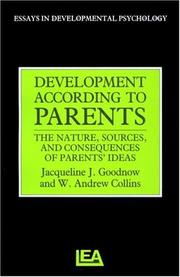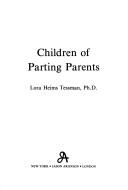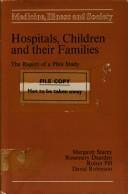| Listing 1 - 10 of 71 | << page >> |
Sort by
|
Dissertation
Year: 2018 Publisher: Liège Université de Liège (ULiège)
Abstract | Keywords | Export | Availability | Bookmark
 Loading...
Loading...Choose an application
- Reference Manager
- EndNote
- RefWorks (Direct export to RefWorks)
Ce mémoire a comme objectif d’explorer le stress ressenti par les parents d’un jeune enfant porteur de trisomie 21 et l’impact de celui-ci sur la qualité de la relation parent-enfant. Il s’agit de tenter de mettre en évidence les stratégies de résilience parentale, ou stratégies de coping, utilisées par les parents pour faire face à ces stress, que sont le diagnostic de trisomie 21 et le développement atypique de l’enfant. Nous avons réalisé un entretien de type semi-directif avec chaque participant. Deux outils ont été soumis aux participants : le Five Minutes Speech Sample (Magana, 1986), utilisé pour mesurer la qualité de la relation parent-enfant sur base des dires et des émotions exprimées par le parent et le questionnaire d’Indice de Stress Parental (Bigras, Lafrenière & Abidin, 1996) permettant de classer les parents en deux groupes : « stress norme » et « stress élevé ». Nos résultats montrent que plus de la moitié des parents rencontrés parviennent à faire face au stress. Cela est attribué au jeune âge des enfants mais surtout au fait que ces parents ont eu accès à des services d’aide et ont bénéficié d’un accompagnement précoce. Ensuite, la stratégie de coping positive la plus influente est le sentiment de compétence parentale. Il agit comme un facteur de protection contre le stress, influence les interactions parent-enfant, pourrait avoir un effet sur l’attachement du parent à l’enfant et, par conséquent, sur le développement de l’enfant. Le soutien social informel et le soutien au sein de la relation conjugale sont également des facteurs parentaux modulant fortement le niveau du stress parental. Tous les parents développent des stratégies de coping négatives à la suite de l’annonce du diagnostic. L’autoblâme et la dépression sont les plus fréquentes. Toutefois, seuls les parents du groupe « stress élevé » font preuve d’un coping négatif au moment de l’interview (affects dépressifs, focalisation sur la planification et attitudes de dramatisation). La dépression est un facteur parental auquel il faut être attentif car c’est un facteur de risque pour la qualité de la relation parent-enfant. En outre, le renforcement de l’enfant à l’égard du parent joue un rôle majeur pour la qualité de l’interaction parent-enfant. Nous avons relevé des troubles du comportement externalisé chez les enfants : impulsivité, opposition, manque d’obéissance, agitation et manque de concentration. Ceux-ci apparaissent à la suite de difficultés de communication parent-enfant ou encore sont liées à l’alimentation de l’enfant. Finalement, les deux pères participant à notre recherche ne décrivent pas une moins bonne qualité de la relation parentenfant que les mères, ce qui suggère qu’ils sont fortement impliqués dans leur rôle parental. Pour conclure nous proposons, dans ce mémoire, des interventions thérapeutiques concernant les différents aspects mis en évidence par nos résultats.
Book
Year: 2019 Publisher: Frontiers Media SA
Abstract | Keywords | Export | Availability | Bookmark
 Loading...
Loading...Choose an application
- Reference Manager
- EndNote
- RefWorks (Direct export to RefWorks)
This eBook is a collection of articles from a Frontiers Research Topic. Frontiers Research Topics are very popular trademarks of the Frontiers Journals Series: they are collections of at least ten articles, all centered on a particular subject. With their unique mix of varied contributions from Original Research to Review Articles, Frontiers Research Topics unify the most influential researchers, the latest key findings and historical advances in a hot research area! Find out more on how to host your own Frontiers Research Topic or contribute to one as an author by contacting the Frontiers Editorial Office: frontiersin.org/about/contact
Science: general issues --- Psychology --- Parenting --- Third generation cognitive-behavioral therapy --- Mindfulness --- Mindful --- Compassion --- Acceptance --- Parent-child relationship --- Online interventions --- Experiential avoidance --- Acceptance and Commitment Therapy
Book
Year: 2019 Publisher: Frontiers Media SA
Abstract | Keywords | Export | Availability | Bookmark
 Loading...
Loading...Choose an application
- Reference Manager
- EndNote
- RefWorks (Direct export to RefWorks)
This eBook is a collection of articles from a Frontiers Research Topic. Frontiers Research Topics are very popular trademarks of the Frontiers Journals Series: they are collections of at least ten articles, all centered on a particular subject. With their unique mix of varied contributions from Original Research to Review Articles, Frontiers Research Topics unify the most influential researchers, the latest key findings and historical advances in a hot research area! Find out more on how to host your own Frontiers Research Topic or contribute to one as an author by contacting the Frontiers Editorial Office: frontiersin.org/about/contact
Parenting --- Third generation cognitive-behavioral therapy --- Mindfulness --- Mindful --- Compassion --- Acceptance --- Parent-child relationship --- Online interventions --- Experiential avoidance --- Acceptance and Commitment Therapy
Book
ISBN: 9021505258 Year: 1976 Publisher: Amsterdam Kosmos Uitgevers
Abstract | Keywords | Export | Availability | Bookmark
 Loading...
Loading...Choose an application
- Reference Manager
- EndNote
- RefWorks (Direct export to RefWorks)
Intellectual Disability --- Parent-Child Relations. --- psychology. --- Parent-Child Relations --- Parent Child Relationship --- Parent-Child Relationship --- Child Relationship, Parent --- Child Relationships, Parent --- Parent Child Relations --- Parent Child Relationships --- Parent-Child Relation --- Parent-Child Relationships --- Relation, Parent-Child --- Relations, Parent-Child --- Relationship, Parent Child --- Relationship, Parent-Child --- Relationships, Parent Child --- Relationships, Parent-Child --- psychology --- Parent-Offspring Interaction --- Interaction, Parent-Offspring --- Parent Offspring Interaction --- Parent-Offspring Interactions
Book
Year: 2019 Publisher: Frontiers Media SA
Abstract | Keywords | Export | Availability | Bookmark
 Loading...
Loading...Choose an application
- Reference Manager
- EndNote
- RefWorks (Direct export to RefWorks)
This eBook is a collection of articles from a Frontiers Research Topic. Frontiers Research Topics are very popular trademarks of the Frontiers Journals Series: they are collections of at least ten articles, all centered on a particular subject. With their unique mix of varied contributions from Original Research to Review Articles, Frontiers Research Topics unify the most influential researchers, the latest key findings and historical advances in a hot research area! Find out more on how to host your own Frontiers Research Topic or contribute to one as an author by contacting the Frontiers Editorial Office: frontiersin.org/about/contact
Science: general issues --- Psychology --- Parenting --- Third generation cognitive-behavioral therapy --- Mindfulness --- Mindful --- Compassion --- Acceptance --- Parent-child relationship --- Online interventions --- Experiential avoidance --- Acceptance and Commitment Therapy --- Parenting --- Third generation cognitive-behavioral therapy --- Mindfulness --- Mindful --- Compassion --- Acceptance --- Parent-child relationship --- Online interventions --- Experiential avoidance --- Acceptance and Commitment Therapy
Book
ISBN: 0898590868 9780898590869 Year: 1982 Publisher: Hillsdale Erlbaum
Abstract | Keywords | Export | Availability | Bookmark
 Loading...
Loading...Choose an application
- Reference Manager
- EndNote
- RefWorks (Direct export to RefWorks)
Parenting --- Congresses --- Parent-Child Relations. --- -Parent behavior --- Parental behavior in humans --- Child rearing --- Parent and child --- Parenthood --- -Congresses --- Parent-Child Relations --- Parent Child Relationship --- Parent-Child Relationship --- Child Relationship, Parent --- Child Relationships, Parent --- Parent Child Relations --- Parent Child Relationships --- Parent-Child Relation --- Parent-Child Relationships --- Relation, Parent-Child --- Relations, Parent-Child --- Relationship, Parent Child --- Relationship, Parent-Child --- Relationships, Parent Child --- Relationships, Parent-Child --- Parent behavior --- Parent-Offspring Interaction --- Interaction, Parent-Offspring --- Parent Offspring Interaction --- Parent-Offspring Interactions --- Parenting - Congresses

ISBN: 0863771602 0863771610 Year: 1990 Publisher: Hove Erlbaum
Abstract | Keywords | Export | Availability | Bookmark
 Loading...
Loading...Choose an application
- Reference Manager
- EndNote
- RefWorks (Direct export to RefWorks)
Child development --- Parent and child --- Enfants --- Parents et enfants --- Développement --- Child Development. --- Parent-Child Relations. --- Infant Development --- Development, Child --- Development, Infant --- Psychology, Child --- Growth --- Développement --- Parent Child Relationship --- Parent-Child Relationship --- Child Relationship, Parent --- Child Relationships, Parent --- Parent Child Relations --- Parent Child Relationships --- Parent-Child Relation --- Parent-Child Relationships --- Relation, Parent-Child --- Relations, Parent-Child --- Relationship, Parent Child --- Relationship, Parent-Child --- Relationships, Parent Child --- Relationships, Parent-Child --- Child development. --- Parent-Offspring Interaction --- Interaction, Parent-Offspring --- Parent Offspring Interaction --- Parent-Offspring Interactions --- Child Development --- Parent-Child Relations

ISBN: 0876683073 9780876683071 Year: 1978 Publisher: New York, NY ; London : Jason Aronson,
Abstract | Keywords | Export | Availability | Bookmark
 Loading...
Loading...Choose an application
- Reference Manager
- EndNote
- RefWorks (Direct export to RefWorks)
Children of divorced parents --- Divorce. --- Parent-Child Relations. --- Divorced parents' children --- Divorced parents --- Adult children of divorced parents --- Children of single parents --- Divorced --- Separated --- Separation --- Divorces --- Separations --- Divorce --- Parent-Child Relations --- Parent Child Relationship --- Parent-Child Relationship --- Child Relationship, Parent --- Child Relationships, Parent --- Parent Child Relations --- Parent Child Relationships --- Parent-Child Relation --- Parent-Child Relationships --- Relation, Parent-Child --- Relations, Parent-Child --- Relationship, Parent Child --- Relationship, Parent-Child --- Relationships, Parent Child --- Relationships, Parent-Child --- Parent-Offspring Interaction --- Interaction, Parent-Offspring --- Parent Offspring Interaction --- Parent-Offspring Interactions

ISBN: 0710067836 Year: 1979 Publisher: London
Abstract | Keywords | Export | Availability | Bookmark
 Loading...
Loading...Choose an application
- Reference Manager
- EndNote
- RefWorks (Direct export to RefWorks)
Sociology of health --- Paediatrics --- Child, Hospitalized. --- Children, Hospitalized --- Hospitalized Child --- Hospitalized Children --- Hospitalization --- Children --- Child, Hospitalized --- Parent-Child Relations --- Psychology, Child --- 316:61 --- 316:61 Medische sociologie --- Medische sociologie --- Psychology, Infant --- Psychology, Pediatric --- Child Psychology --- Infant Psychology --- Pediatric Psychology --- Child --- Infant --- Psychology, Developmental --- Hospital patients, Child --- Hospitalized children --- Hospital care --- Parent Child Relationship --- Parent-Child Relationship --- Child Relationship, Parent --- Child Relationships, Parent --- Parent Child Relations --- Parent Child Relationships --- Parent-Child Relation --- Parent-Child Relationships --- Relation, Parent-Child --- Relations, Parent-Child --- Relationship, Parent Child --- Relationship, Parent-Child --- Relationships, Parent Child --- Relationships, Parent-Child --- psychology --- Institutional care --- Parent-Child Relations. --- Hospital care. --- Parent-Offspring Interaction --- Interaction, Parent-Offspring --- Parent Offspring Interaction --- Parent-Offspring Interactions
Book
ISBN: 9781462543472 1462543472 Year: 2020 Publisher: New York The Guilford Press
Abstract | Keywords | Export | Availability | Bookmark
 Loading...
Loading...Choose an application
- Reference Manager
- EndNote
- RefWorks (Direct export to RefWorks)
"This state-of-the-art clinician's guide describes Perinatal Child-Parent Psychotherapy (P-CPP), a treatment for pregnant women and their partners whose readiness to nurture a baby is compromised by traumatic stress and adverse life experiences. An application to pregnancy of the widely disseminated, evidence-based Child-Parent Psychotherapy, P-CPP spans the prenatal period through the first 6 months of life. Extended cases illustrate ways to help mothers and fathers understand how trauma has affected them, navigate the physical and emotional challenges of becoming parents, build essential caregiving competencies, and ensure the safety of their babies and themselves. Cultural considerations in working with diverse families are addressed through specific intervention examples. Key words/subject areas: parent-infant psychotherapy, psychotherapy with pregnant women, at-risk mothers and infants, perinatal mental health, P-CPP, early intervention, treatment manuals, parenting interventions, infant mental health, Don't Hit My Mommy, child abuse, early childhood, incest survivors, family violence, prevention, parenting programs, maltreatment, evidence-based, attachment-based Audience: Clinical psychologists, psychiatrists, social workers, counselors, and nurses; researchers in the areas of perinatal and infant mental health"--
Parent-child interaction therapy. --- Parent-infant psychotherapy. --- Perinatology --- Psychic trauma --- Psychological aspects. --- Treatment. --- Parent-child interaction therapy --- Parent-infant psychotherapy --- Psychological aspects --- Treatment --- Family Therapy --- Parent-Child Relations --- Medicine, Perinatal --- Perinatal medicine --- Obstetrics --- Pediatrics --- Parent-infant psychoanalysis --- Parent-infant psychoanalytic therapy --- Infant psychiatry --- PCIT (Child psychotherapy) --- Child psychotherapy --- methods --- Parent Child Relationship --- Parent-Child Relationship --- Parent-Offspring Interaction --- Interaction, Parent-Offspring --- Parent Child Relations --- Parent Child Relationships --- Parent Offspring Interaction --- Parent-Child Relation --- Parent-Child Relationships --- Parent-Offspring Interactions --- Relation, Parent-Child --- Relationship, Parent Child --- Relationship, Parent-Child --- Perinatology - Psychological aspects --- Psychic trauma - Treatment
| Listing 1 - 10 of 71 | << page >> |
Sort by
|

 Search
Search Feedback
Feedback About UniCat
About UniCat  Help
Help News
News